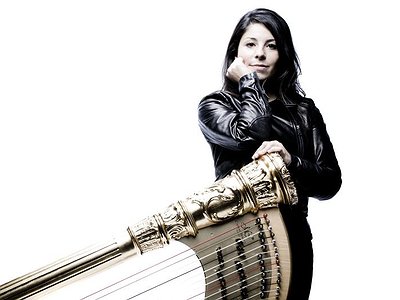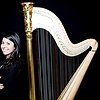Part 1
Name: Anneleen Lenaerts
Nationality: Belgian
Occupation: Harpist
Current Release: Schumann and Schubert on Warner Classics
Website: If you enjoyed this interview with Anneleen Lenaerts, you can find more information about her on her website.
When did you start playing your instrument, and what or who were your early passions and influences?
I started playing piano at the age of 8, following in the footsteps of my older brother and sister. A year later I wanted to choose a second instrument in order to join the local band. I was persuaded by my solfege teacher and conductor of the orchestra to play the harp. I had never seen or heard this instrument before but I took a chance and I’m so happy that he convinced me!
For most artists, originality is first preceded by a phase of learning and often, emulating others. What was this like for you? How would you describe your own development as an artist and the transition towards your own voice?
During my harp studies, my interest in composition led me to place equal focus on the intense study of harmony, counterpoint and fugue, which resulted in a deeper understanding of the musical score. The more I studied the more respect I gained for the great masters and compositions that we practiced. Ultimately, we are “only” a medium or the voice of a composer. Whenever I begin a new piece, out of respect for the composer’s art, I start by analysing the music and then build my own interpretation from the information I find in the score. I think this is how I built my own voice for the harp.
Tell me about your instrument, please. How would you describe your relationship with it? What are its most important qualities and how do they influence the musical results – and possibly even your own performance?
As you will understand from the first question, I started the harp kind of by accident. Of course I love it now, but I have to say that I believe the music to be more important. An instrument is literally an ‘instrument’ to express music. However the harp is not very well known as a solo instrument and it’s very complex, with seven pedals to make all chromatic changes happen. Therefore I think it’s very important to make, not only audiences, but also composers, curious about the harp and hopefully motivate them to write for it! I think the harp’s greatest quality is it’s range of colours and there are many different techniques to bring out different atmospheres.
What were some of your main artistic challenges when starting out as an artist and how have they changed over the years?
From the first steps of my career to this moment, everything has taken a very natural course. Even now when people ask me what my dreams or my goals are, I would say that it’s doing what I’m doing now to the best of my ability. If I’m successful, like I have been so far, I’m a very happy person. It may sound simple, but I don’t think we should forget that music still has the ability to reach and touch audiences and that’s what gives me the biggest pleasure.
What are some of the most important and influential interpretations to you personally, both live and on recording – and why? Which interpretations have perhaps entirely changed or questioned your perspective on a particular piece of music?
Well I’ve been a member of the Vienna Philharmonic for four years now. We are also the Vienna State Opera, meaning we have a double agenda. Before joining this orchestra, I interpreted my pieces musically as well as I could with the knowledge I had. However entering the traditional world of this orchestra, with which the likes of Strauss, Mahler and Brahms have worked and in which traditions have been passed on over the years, has been of huge value to me. I think I developed enormously as a musician by getting to know their interpretations and by working live with the best conductors and soloists of the moment.
Tell us about your studio/work space, please. What were criteria when setting it up and how does this environment influence the creative process? How important, relatively speaking, are factors like mood, ergonomics, haptics and technology for you?
To be honest, my work space is quite simple; it’s just a room with a sofa and a harp. I would say it’s very important to remove all distractions such as mobiles or laptops and to try to be creative.
Could you take me through the process of interpretation based on a piece that's particularly dear to you, please? What do you start with when working on a new piece? How do you form your creative decisions and how do you refine them?
Well, after learning the notes, I think it’s very important to understand how a piece has been composed, to analyse it and understand the composer’s wishes. In the end we are “only” the transmitters of someone else’s music and I think we should maintain the highest respect for the score. Of course one adds one’s own musical personality but only within the frame of the composers wishes.






